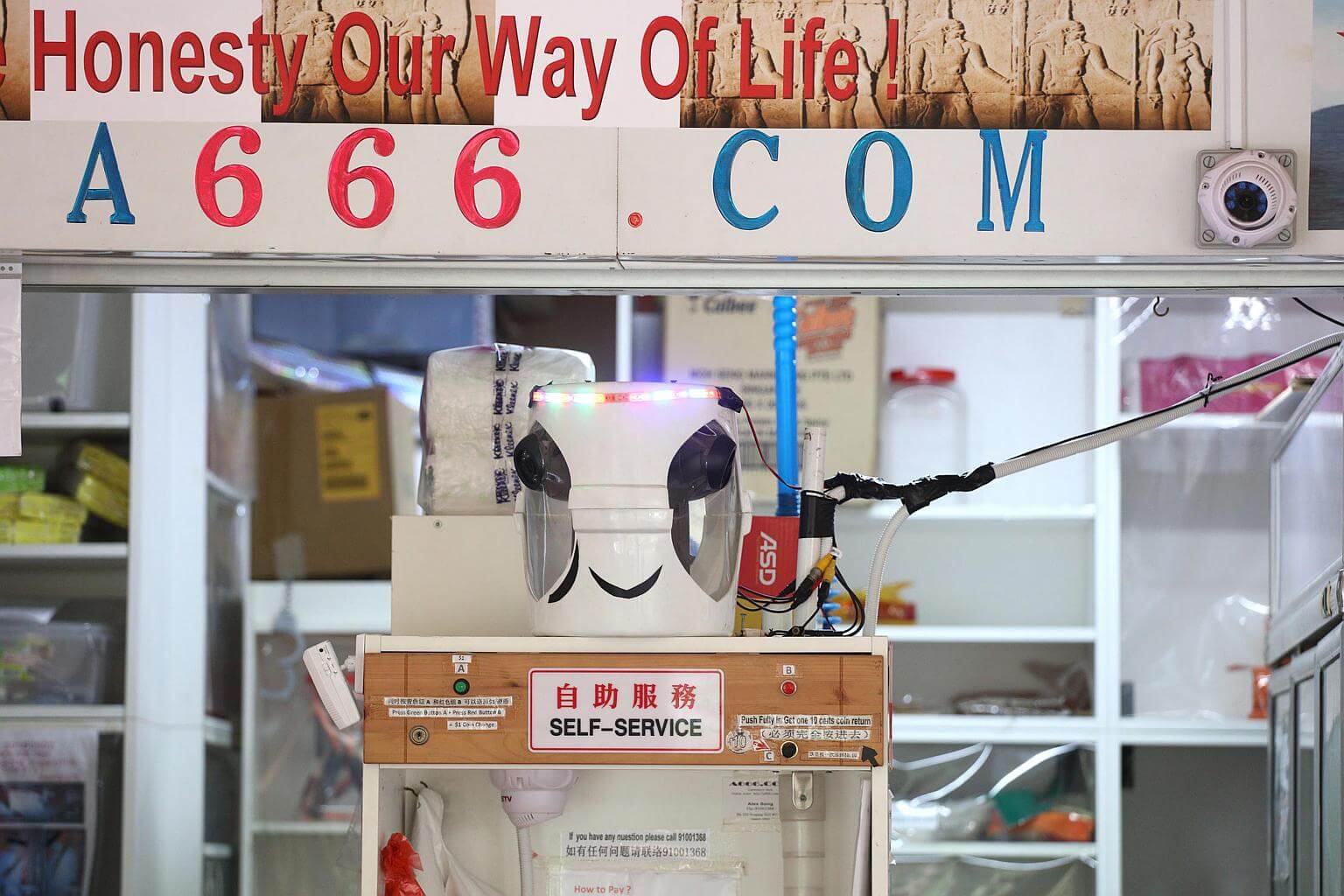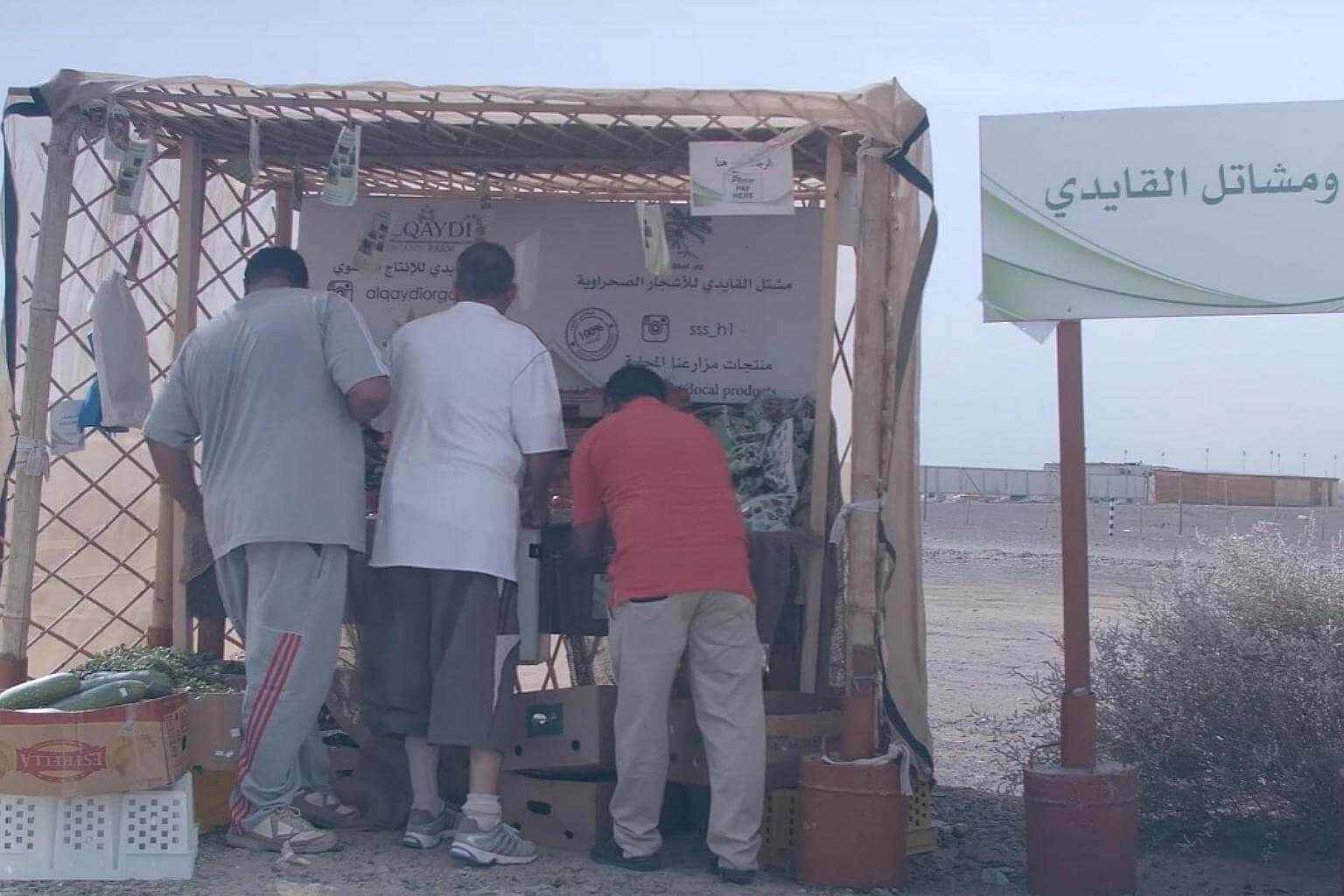Hougang provision shop runs on customers' honesty: 7 other 'unmanned stores' worldwide
Sign up now: Get ST's newsletters delivered to your inbox

Provision shop in Hougang which has no shopkeepers and customers are asked to pay by themselves at a cash register.
PHOTO: DON WONG FOR THE STRAITS TIMES
SINGAPORE - A provision shop in Hougang is in the spotlight for going "unmanned", with no shopkeeper or attendants to serve customers or safeguard its goods.
The store's owner, Mr Alex Song, built a self-service cash register for customers to check out their purchases and set up closed-circuit television cameras to help him spot thieves.
Singapore Mini Mart Association chairman Alan Tay has said that Mr Song's system, while innovative, has yet to make in-roads in Singapore. "I think we haven't reached the standard of say, the Japanese, when it comes to being honest and disciplined," said Mr Tay.
Here's a look at other "honesty kiosks" and fully automated shopping systems around the world.
1. MUJIN HANBAI (JAPAN)

PHOTO: YOMIURI SHIMBUN/ASIA NEWS NETWORK
In Japanese, "mujin hanbai" can be translated as "unmanned stores" and commonly refer to unattended roadside stalls where farmers can display their produce for passers-by to pick out and pay for.
The farmers do not rely on mujin hanbai to sell their fruits and vegetables, but use it as a system to clear stock that has not been sold at local markets.
Encouraging honesty and cutting down food wastage - that's a smart way to kill two birds with one stone.
2. VEGETABLES WITHOUT A SELLER (UAE)

Community members in the United Arab Emirates city of Sharjah took a leaf out of the Japanese playbook with a similar self-service vegetable stall that opened in February 2016.
The kiosk, where customers can drop their money in an unsupervised payment box, is part of a project called "Vegetables Without A Seller" that aims to promote neighbourly trust and goodwill in Sharjah's Maleha district.
Gulf News reported that the project was the brainchild of local landowner Salem Sultan Al Qayidi, who stocks the stall with organic vegetables from his farms.
One customer told the news outlet that he used the stall to impress upon his children a pious sense of honesty.
3. HONESTY COFFEE SHOP (PHILIPPINES)

The Honesty Coffee Shop in the Philippine province of Batanes began in 1995 as a counter stocked with coffee and water for thirsty fishermen.
Retired teacher Elena Castaño and her husband Jose Gabilo, a former local politician, eventually turned the shack into a full-fledged store that runs on the honour system. At the Honesty Coffee Shop, locals and tourists can help themselves to staples like biscuits, coconuts and soft drinks, as well as souvenirs like T-shirts and an indigenous headdress from the area.
Although she is plagued by visitors who grab and go without paying, Mrs Gabilo does not mind running the store at a loss because she and her husband have other sources of income.
But Mrs Gabilo puts her faith in divine providence. She said in Tagalog to The Philippine Star that errant visitors might still return to make payment.
"Otherwise, they will not go to heaven," she added.
4. NARAFFAR (SWEDEN)

A 24-hour convenience store in the small town of Viken, in Sweden, uses technology to keep customers on the straight and narrow.
Set up in January 2016 by IT specialist Robert Ilijason, the Naraffar convenience store requires customers to download an iPhone app to unlock the front door and scan their purchases. The app is linked to their bank accounts, so customers are billed monthly for what they have bought.
According to wire reports, Naraffar stocks everyday products such as bread, milk, soap and diapers, although it does not sell tobacco or alcohol.
Mr Ilijason can keep an eye on his business through surveillance cameras and also receives text notifications if the door activity suggests he is being burgled.
5. VILLAGE VENDING (BRITAIN)

The quaint English village store may be going the way of the dinosaur, but Derbyshire businessman Peter Fox has been trying to resurrect it in vending machine form since 2014.
That was the year that Mr Fox rolled out The Speedy Shop in the village of Clifton. The vending machine, decked out with a fake brick design and a striped awning that is meant to recall the provision shops of yore, dispenses more than 80 household goods such as canned food, milk and bread.
Residents told the BBC that Mr Fox's "Village Vending" idea was convenient for rural communities that were too small to support a dedicated grocery store. He has since set up more such automated kiosks in other parts of the county.
6. ATCHAYAM'S FOODBOX (INDIA)

Entrepreneur Satish Chamyvelumani cooked up the hot idea for an automated eatery and opened the first Atchayam's Foodbox outlet in the Tamil Nadu city of Chennai in 2014.
At Atchayam's Foodbox, diners use a touch screen to order their meal, which is supplied to the store by partner restaurants. They then swipe their payment card and have the reheated food delivered to them on a conveyor belt. The process takes under two minutes.
7. SOFTBANK MOBILE STORE (JAPAN)

Japanese tech firm SoftBank has been touting its humanoid Pepper robots for several years now, so earlier this year, the company put its money where its mouth is and showed off Pepper's abilities at a pop-up robot-staffed store selling mobile products.
Pepper is popular in its home country. While not entirely robot-run, some of Nestle's Nescafe stores in Japan have already had Pepper models on their sales floors for a while. Nestle announced in 2014 that it would deploy the robots to chat with customers looking to buy Nescafe coffee machines.
Other places are also eyeing Pepper with interest. In early October, Taiwan's First Commercial Bank "hired" a Pepper robot to serve customers at a Taipei branch.


